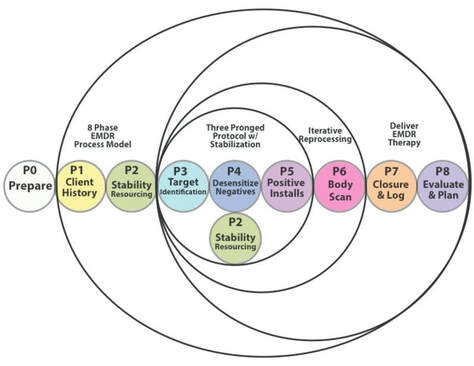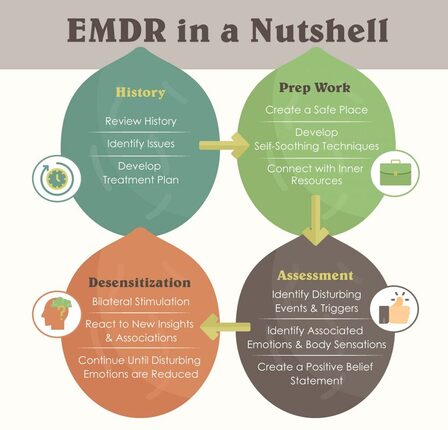- Home
- About me & CK Therapy
- The CK Team : Compassionate Partners
- Contact us
- Services and Fees
- Client Testimony
- EMDR - Eye movement desensitisation and reprocessing therapy
- Art Therapy
- Music Therapy
- DBT
- Person Centred Therapy
- Mental health forum
- FAQ's
- Useful links and Crisis support
- Resources
- CK Client Hub
- Work with us
- Psychotherapy Trainee facilitated Therapy
EMDR is an evidence based Psychotherapy treatment that helps people heal from the symptoms and emotional distress a person feels as a result of trauma.
|
The typical treatment often includes sessions in which you focus on an experience which is troubling you. While thinking about the experience, you follow the therapist’s fingers (or a light bar) from left to right with your eyes. These movements back and forth are referred to as “Bilateral Stimulation”. It is not hypnosis: you remain fully conscious throughout. Other forms of bilateral stimulation that may be used are tapping left and right and listening to sounds in your left and right ear. The therapist will talk to you about the different options and find the one that suits you best.
|
The procedure of thinking about the distressing experience and following the bilateral stimulation results in the disturbing memory losing its intensity. It is not forgotten but it ceases to be troubling. In other words, it has been “desensitised” and “reprocessed”.
This is not always the case as we may be working with alternative protocols depending on what you are exploring in EMDR e.g. to support with a phobia or a core belief this would be slightly tweaked.
This is not always the case as we may be working with alternative protocols depending on what you are exploring in EMDR e.g. to support with a phobia or a core belief this would be slightly tweaked.
Who is EMDR for?
EMDR is for people who have symptoms of Post Traumatic Stress Disorder (PTSD) or trauma in the context of other presentations. This means that something that took place in the past, and which was very disturbing, gets replayed as if it isstill happening in the present – for example, through flashbacks or nightmares, unwanted thoughts, images and sensations. This can make you feel anxious and constantly on guard and may lead you to avoid situations which trigger the memories.
It can also be used for more than trauma work. Including;
- Chronic pain
- OCD
- Core negative beliefs e.g. I am not good enough, I need to be perfect, I am not in control.
- Fears and Phobias.
Get in contact to learn more.
How does it work?
The idea is that traumatic events which are overwhelming are not stored like other memories - they remain active and intrusive. The bilateral stimulation used in EMDR involves a dual focus of attention, requiring you to focus on something happening in the present (for example, following the therapist’s fingers) while thinking about the event in the past. This enables the brain to process and store the memory correctly.
How effective is EMDR?
Scientific trials of its effectiveness have shown that it is highly effective. It is recommended by NICE as a treatment for PTSD.
What is an EMDR session like?
The initial sessions will involve an assessment of things that are troubling you at the moment, including aspects of your past experience which may be contributing to the problem.
Subsequent sessions involve preparing you for desensitisation and reprocessing by teaching techniques to manage any distress that arises during the processing.
At the end of each session, the therapist will focus on using techniques to leave you in a calm state and provide information about what to expect in between sessions (e.g. some people may find themselves remembering more aspects of the memory) and a suggestion to keep a log.
At the beginning of each subsequent session, the therapist will review your week and the processing that remains to be done.
Who can provide EMDR?
EMDR should be practised by therapists who have a core mental health profession and a formal training in EMDR whichmeets the competences of the UCL competence framework or of EMDR accreditation bodies.
EMDR is for people who have symptoms of Post Traumatic Stress Disorder (PTSD) or trauma in the context of other presentations. This means that something that took place in the past, and which was very disturbing, gets replayed as if it isstill happening in the present – for example, through flashbacks or nightmares, unwanted thoughts, images and sensations. This can make you feel anxious and constantly on guard and may lead you to avoid situations which trigger the memories.
It can also be used for more than trauma work. Including;
- Chronic pain
- OCD
- Core negative beliefs e.g. I am not good enough, I need to be perfect, I am not in control.
- Fears and Phobias.
Get in contact to learn more.
How does it work?
The idea is that traumatic events which are overwhelming are not stored like other memories - they remain active and intrusive. The bilateral stimulation used in EMDR involves a dual focus of attention, requiring you to focus on something happening in the present (for example, following the therapist’s fingers) while thinking about the event in the past. This enables the brain to process and store the memory correctly.
How effective is EMDR?
Scientific trials of its effectiveness have shown that it is highly effective. It is recommended by NICE as a treatment for PTSD.
What is an EMDR session like?
The initial sessions will involve an assessment of things that are troubling you at the moment, including aspects of your past experience which may be contributing to the problem.
Subsequent sessions involve preparing you for desensitisation and reprocessing by teaching techniques to manage any distress that arises during the processing.
At the end of each session, the therapist will focus on using techniques to leave you in a calm state and provide information about what to expect in between sessions (e.g. some people may find themselves remembering more aspects of the memory) and a suggestion to keep a log.
At the beginning of each subsequent session, the therapist will review your week and the processing that remains to be done.
Who can provide EMDR?
EMDR should be practised by therapists who have a core mental health profession and a formal training in EMDR whichmeets the competences of the UCL competence framework or of EMDR accreditation bodies.
EMDR Testimony from a verified google review ;
"I had the most positive and wonderful experience during my therapy sessions with Catherine and I would highly recommend her to anyone.Catherine is so welcoming and supportive and explains everything so well. Her professionalism at every stage, combined with her warmth and genuine nature meant that the therapy sessions with Catherine have changed my life, and that is not an exaggeration. She works at your pace and is so compassionate you are able to talk to her so openly without any fear of judgement. I was sceptical about whether EMDR therapy would really work and it really does work! I had experienced a range of traumatic events that had affected my life for a fair few years and by going through the EMDR process with Catherine, I was able to process them effectively in a way I never thought I'd be able to. Catherine takes the time at every stage of the session to ensure that you are ok and really makes sure that you have processed everything. She has a way of explaining things that really helps you understand yourself better and the techniques she suggested will stay with me forever and are so helpful in every day life. I now live my life free from the cloud that once hung over me and that is all down to the work I have done with Catherine and her guidance, I honestly can't thank her enough.Catherine has created a really safe space with comfortable furnishings and lovely art on the walls. She provides a nice drink as you come in and the space feels homely and welcoming. If you are considering therapy then definitely book in with Catherine, you will have the best experience and life changing results."
"I had the most positive and wonderful experience during my therapy sessions with Catherine and I would highly recommend her to anyone.Catherine is so welcoming and supportive and explains everything so well. Her professionalism at every stage, combined with her warmth and genuine nature meant that the therapy sessions with Catherine have changed my life, and that is not an exaggeration. She works at your pace and is so compassionate you are able to talk to her so openly without any fear of judgement. I was sceptical about whether EMDR therapy would really work and it really does work! I had experienced a range of traumatic events that had affected my life for a fair few years and by going through the EMDR process with Catherine, I was able to process them effectively in a way I never thought I'd be able to. Catherine takes the time at every stage of the session to ensure that you are ok and really makes sure that you have processed everything. She has a way of explaining things that really helps you understand yourself better and the techniques she suggested will stay with me forever and are so helpful in every day life. I now live my life free from the cloud that once hung over me and that is all down to the work I have done with Catherine and her guidance, I honestly can't thank her enough.Catherine has created a really safe space with comfortable furnishings and lovely art on the walls. She provides a nice drink as you come in and the space feels homely and welcoming. If you are considering therapy then definitely book in with Catherine, you will have the best experience and life changing results."
- Home
- About me & CK Therapy
- The CK Team : Compassionate Partners
- Contact us
- Services and Fees
- Client Testimony
- EMDR - Eye movement desensitisation and reprocessing therapy
- Art Therapy
- Music Therapy
- DBT
- Person Centred Therapy
- Mental health forum
- FAQ's
- Useful links and Crisis support
- Resources
- CK Client Hub
- Work with us
- Psychotherapy Trainee facilitated Therapy


